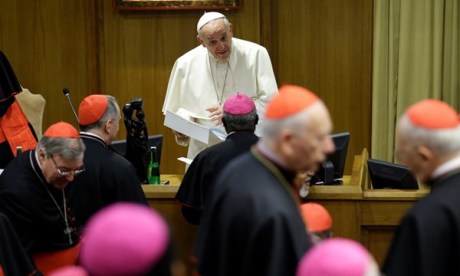The final report from the synod on the family has narrowed down aspects of a “welcoming” preliminary report, especially concerning gay people.
The preliminary report, issued half way through the synod, asked if the Church community was welcoming to gay people.
It noted that gay people have “gifts and qualities to offer to the Christian community” and acknowledged some positive aspects of same-sex relationships.
But final document, the relatio synodi, restated norms from the Congregation for the Doctrine of the Faith.
It stated that there “is no foundation whatsoever” to compare homosexual marriage to heterosexual marriage.
But it said gay people “should be welcomed with respect and sensitivity” and that discrimination against gays “is to be avoided”.
The paragraph containing this text did not get the traditional two thirds majority (122 votes) needed to be included in the final report, with 118 bishops voting for it and 62 against.
But this may have indicated the some progressive bishops felt the final text had been too watered down or restrictive.
Two other proposed paragraphs also did not get to the two thirds threshold, but did get absolute majority votes.
Both concerned the issue of Communion for divorced and remarried people.
One proposed: “Any access to the sacraments should be preceded by a penitential journey under the responsibility of the diocesan bishop.”
But Pope Francis decided to include these three paragraphs in the final report anyway, in the interests of maximum transparency, a Vatican spokesman said.
Bishops’ conferences will use the document, described as a work in progress, in preparation for the 2015 synod.
The final report was the product of revisions last week of small working groups of bishops.
In a three-page “message” on Saturday, the synod fathers called for the Church to be “a house with doors always open to welcome everyone”.
In his final address at the synod, Pope Francis called on the prelates to “feed the flock” and to search for lost sheep.
The Pontiff directed them to avoid the temptation to become a “hostile rigorist” concerned only with enforcing Church doctrine.
He also warned against being a “destructive do-gooder” that advocates “false mercy” instead of truth telling.
Sources
